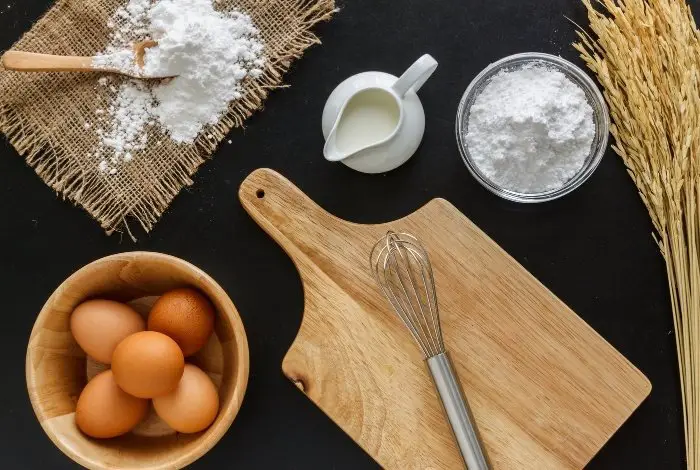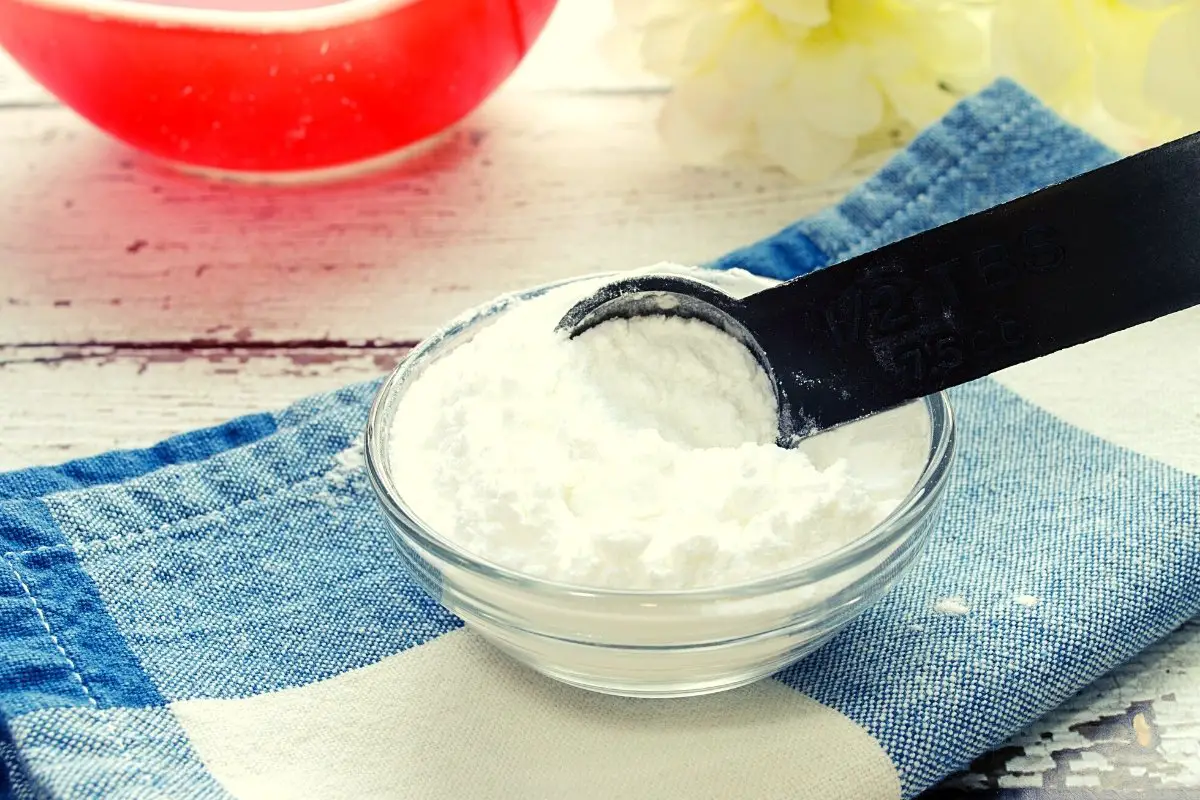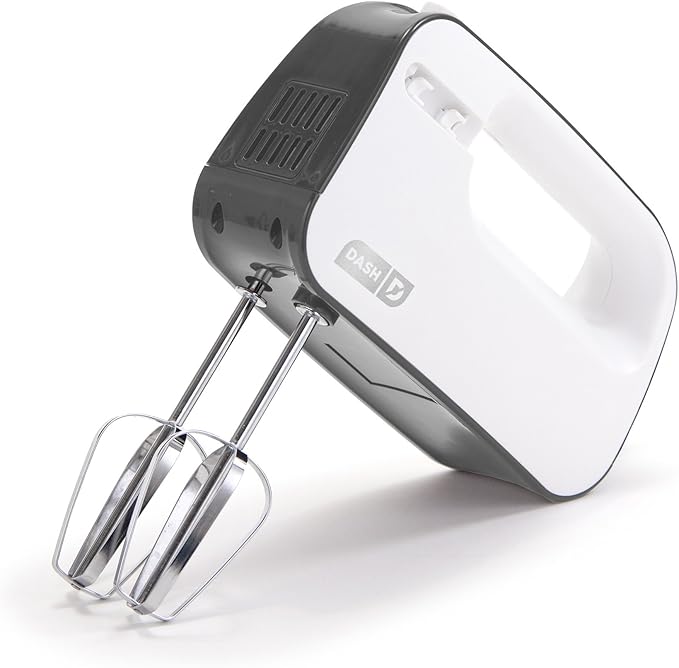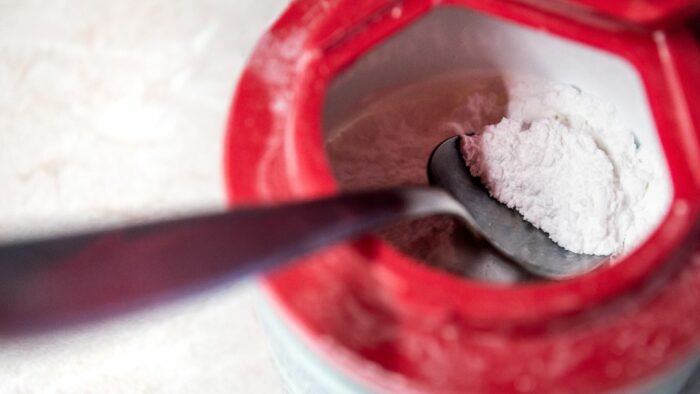Last Updated on February 25, 2023
Is baking powder bad for you? Should you stop using it in your baked goods because it is bad for your health? Well, you came to the right place. This article will provide you with the answers to knowing what baking powder is, how it works, the types, and why it can be bad for you.
What is Baking Powder?
Baking powder is a leavening agent that is made of sodium bicarbonate (baking soda), an acid (such as cream of tartar), and cornstarch. Since it is a complete leavening agent it is commonly used without additional acidic ingredients.
The baking powder becomes activated when it interacts with a liquid. When baking soda comes in contact with a liquid, a chemical reaction occurs, which releases carbon dioxide (CO2) into the batter or dough. This is what leads cakes, cookies, and other baked goods to rise when baking, giving them their desirable textures.
Baking powders come in two types, single-acting baking powder and double-acting baking soda. However, single-acting baking powders are usually for food manufacturers and are not typically accessible for household use. The double-acting type is the most common kind of baking powder.
Also, the double-acting type of baking powder produces two distinct reactions. The first reaction occurs when mixed with liquid at room temperature. And the second reaction happens once the mixture has been heated. Likewise, it is favorable to have an extended reaction because the rising and leavening do not co-occur.

Baking powder is a dry chemical leaving agent that increases the volume and lightens the texture of baked goods. It is often confused with baking soda, however, the two are slightly different. Some recipes may call for baking soda, some for baking powder, and others for both.
Single-acting baking powders
Single-acting baking powders are categorized through the kind of acid they use, especially cream of tartar that produces gas instantly when combined with baking soda and a liquid. For instance, aluminum sulfate powders react more gradually at room temperature, although they give a bitter flavor to the batter.
On the other hand, slower single-acting baking powders are phosphate baking powder with either disodium pyrophosphate or calcium phosphate. Hence, single-acting baking powder immediately creates most of its gas when combined with a liquid.
Double-acting baking powders
Double-acting baking powders are the most common type of baking powder commercially since a small quantity of gas is released when combined with a liquid. For this reason, this type of powder allows a batter to last longer in an unbaked condition.
Baker’s Ammonia (Ammonium Carbonate) is a less often type of baking powder that results in an airy, light product yet can give an ammonia taste if not properly used. In addition to that, it is commonly used in baking flat cookies, making it easier to dissipate the ammonia smell.
How Does Baking Powder Work?
Baking powder works by releasing CO2 (Carbon Dioxide) into a dough or batter through an acid-base reaction resulting in bubbles in the wet mixture. When the fermentation flavors are unpleasant, baking powder is ideal rather than yeast. Likewise, it is the preferred option whenever the batter lacks the elastic structure to hold gas bubbles, or there is a need to speed the production.
Dash Smart Store Compact Hand Mixer Electric
Check out Best Hand Mixer for the Money in 2020
Is Baking Powder Bad for You?
So, is baking powder bad for you? Baking powder is a common household ingredient that many people have on hand for baking, cooking, and even cleaning.
Baking powder is not bad for you when it is properly used. When used in baking, it is safe and non-toxic. However, complications can occur if you overdose on baking powder.
To overdose on baking powder, you would have to consume large quantities. Baking powder is completely safe to eat when in baked goods and you can eat a lot of baked goods without it posing any harm. However, you should not eat baking powder on its own.
Overdosing on baking powder can result in thirst, abdominal pain, nausea, severe vomiting, and diarrhea. While consuming a small amount by itself will likely cause no harm you do not want to eat baking powder by a spoonful.
It is not good for you to eat baking soda on its own as it has sodium bicarbonate in it, which belongs to a group of drugs known as antacids. Likewise, it is a generic drug to treat upset stomachs caused by acid reflux irritation.
Sodium bicarbonate is safe enough to consume for most people as an antacid a couple of times. However, it can have problems if not utilized properly.
For example, excessive baking powder will ruin cake batter and also it will make its taste unpleasant. It is best to add the recommended quantity to achieve your baked goods’ best result. Besides, it can lead to serious complications due to allergic reactions and overdoses.
Though all baking powders contain sodium bicarbonate, similar to baking soda, they also have two kinds of acids. Monocalcium phosphate is one of these acids, and it does not react with the sodium bicarbonate while it is dry. However, the moment it is combined into a wet batter or dough, both ingredients start to react. In the process, it releases bubbles of CO2 that result in chemical leavening.
Can you eat baking powder?
It is perfectly safe to eat baking powder in baking and cooking. However, you do not want to consume baking powder alone, as you may experience adverse effects if consumed in high quantities.
In most recipes that call for baking powder, the amount called for will typically be one teaspoon or less. So, this means that you likely consume between 1/8 to 1/12 a teaspoon or less of baking powder per serving of baked goods.
Baking powder can come with some health benefits such as promoting oral health and improving kidney functions. However, you should not intake baking powder for health purposes without consulting a doctor first.
How much baking powder is too much?
You would likely have to eat a couple of teaspoons of baking powder by itself to have any adverse effects on you. Typically, you don’t have to worry about consuming too much baking powder from eating baked goods. You would have to eat several servings and you would likely get a stomach ache from all the sugar before the baking powder would affect you.
Overdosing on baking powder is typically not something you have to worry about. As long as you don’t eat baking powder by itself you typically won’t have to worry about eating too much. Baking powder overdoses are rare and it is also rare to have an allergic reaction to baking powder as well.
If you accidentally added too much baking powder to your baked good it is likely safe to eat. However, your baked good may have a metallic taste. In addition, too much baking powder can cause cakes to rise too much too quickly, which can result in them collapsing.
Read about Comparing Baking Soda vs Baking Powder
Baking Powder’s Shelf Life
It can last for about 6 to 18 months. It is ideal for keeping it in a cool, dry place. Avoid putting it in the refrigerator since moisture can spoil it. Add a small amount of water to it, and if it fizzes, then it is still good.
Conclusion: Is Baking Powder Bad for You?
It would be best to look for the appropriate proportion of acid and base to achieve the best results. For this reason, baked goods can vary significantly in their distinct acidity level. That is why it is best to add small quantities to your baked goods since baking powder can be bad for you, especially in high amounts.

Zarah is an experienced pastry chef whose creations have delighted countless customers. With a passion for baking, Zarah has developed a unique style that combines classic techniques with modern flavors. Her desserts are consistently crafted with the finest ingredients, and her attention to detail is evident in the stunning and delectable results. Zarah has a wealth of experience in the pastry kitchen, and loves to share her knowledge with others. Whether it is teaching a class or creating a custom cake for a special occasion, Zarah is committed to making sure every customer is satisfied.



